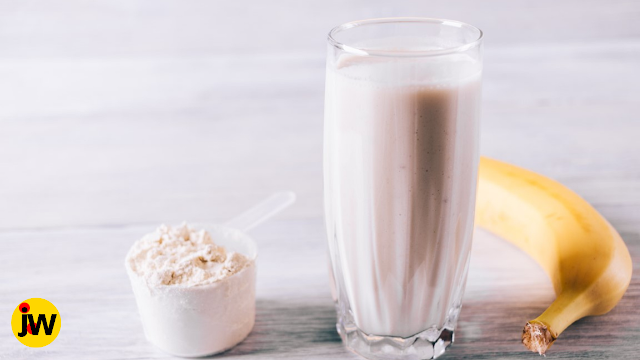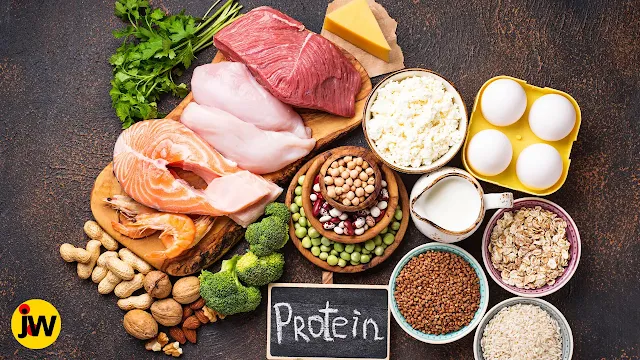First of all, let’s acknowledge something important: all protein supplements are not created equal.
We want to avoid high-glycemic whey isolate products or anything with refined sugar or artificial additives. There are three key things to look for when choosing a protein powder:
- Quality
- Purity
- Affordability.
It can be hard to tell what you’re actually getting when you pick up a tub of whey protein powder at your local GNC.
Why choose Paleo?
With so many protein powders out there, it can be hard to know what’s good for you and what isn’t. Paleo powders are not just convenient, but they help ensure you get enough of your daily nutrients.
But how do you choose?
You want a powder that is high in protein, contains probiotics (more on that later), is low on carbs and sugar, minimally processed (to keep with Paleo philosophy), tastes good...and that’s just for starters!
With these criteria in mind, we created an extensive guide so you can make an informed decision as to which supplement works best for your body.
What Is the Paleo Lifestyle?
The Paleo lifestyle centers around eating similar to what our ancestors did; that means no grains, no legumes, no dairy, little sugar, and no processed foods. Meat eaters can get what they need from fish or grass-fed meats; vegetarians have legumes and nuts.
The theory behind Paleo is that because humans evolved over time without these foods in their diet there isn’t an ideal way for our bodies to process them properly most notably gluten (found in wheat products), which some people have difficulty with digesting.
A few brands that offer protein powders will allow for more flexibility as far as what you put into your smoothie by including proteins like soy; be sure you don’t include any non-Paleo ingredients when possible.
A Paleo Diet Meal Plan
What’s on Your Plate?
A protein powder supplement that complements your diet will depend heavily on how you use it. If you're someone who relies on protein shakes or smoothies, stick with a whey-based, egg white–type powder; they're made from ingredients that are easily digested.
If you tend to add protein powders into recipes, like baking or cooking with meats or vegetables (e.g., sautéing beef in extra virgin olive oil), look for options that are sourced from nuts.
Nut-based proteins offer many of the same benefits as whey, but more slowly so instead of being broken down quickly and converted into energy, they're absorbed directly by cells for repair and building purposes.
Does It Work for Weight Loss?
A protein powder that helps you lose weight probably doesn’t exist, but if it did, it would do so in two ways:
by filling you up more, or by making you feel fuller longer. But most of these products are protein shakes that don’t mean they’re bad for your diet.
However, many of them have added sugars or artificial ingredients that could hurt your waistline in other ways. Some even have questionable serving sizes (our favorite kinds of supplements are those with easily measurable servings).
You need to be careful about these things when looking for a good weight-loss powder. If a product has 500 calories per serving but requires 10 servings daily that's almost 5,000 calories in one day!
Does it aid weight loss?
A lot of protein powders claim they aid weight loss, but not all of them can make that promise. You should look for a protein powder with only natural ingredients and no fillers like sugar or soy.
Look for high-quality ingredients like egg white protein or whey (if you’re vegetarian). Most importantly, read nutrition labels carefully and try to find one that’s relatively low in calories and high in grams of protein.
If your goal is weight loss, you don’t want to go overboard on extra calories from sugary syrups or calorie-rich additives.
Foods to Avoid on the Paleo Diet
Dairy, grains, beans, corn. These foods just don’t work with your body’s natural protein receptors, causing digestive issues and inflammation. A good Paleo diet would eliminate dairy from your life entirely but many people get enough calcium from other sources (hello veggies!) that it isn’t necessary.
Still, others turn to a plant-based protein powder for help and there are plenty of options out there for vegans and meat-eaters alike.
Just be sure that you look for one that fits in with your version of Paleo: Is it dairy-free? Is it grain-free? What about soy or gluten? Be aware of how these ingredients affect your diet!
Does the Paleo Diet work?
Some people swear by it, while others have gotten sick from following it. To find out if you can reap any of its benefits without getting ill, it's helpful to understand what actually makes up a Paleo diet.
The basic philosophy revolves around eating foods that our hunter-gatherer ancestors would have eaten.
You'll want to minimize your intake of grains, dairy, legumes (except for beans), and refined sugars in favor of fruits, vegetables, and lean meats.
In some cases where grains are reintroduced into your diet such as with cereals made from sprouted seeds, you may be able to find something in line with Paleo principles.
Is Paleo healthy or unhealthy?
Like any diet, there are pros and cons. Proponents of paleo diets say it can be very healthy because it’s designed around lean meats, nuts, seeds, vegetables, and fruit and cuts out processed foods.
But like other fad diets (the protein-heavy Atkins diet comes to mind), it’s not sustainable in its strictest form. More importantly, some research suggests that grains an important part of most people’s diets can actually promote health if eaten in moderation.
It also fails as a diet for athletes: One of paleo’s selling points is that by eliminating processed foods you increase your intake of nutrients like potassium and magnesium; however, active people may need more fuel than they can get from fresh produce alone.
How to Find a Paleo Protein Powder
The Paleo diet encourages fresh foods, but when you are recovering from an injury or aren’t getting enough protein in your diet, some protein powder may be necessary.
Some of these powders can have fillers that cause issues for those following a Paleo lifestyle, so it’s important to make sure you choose one that complements your Paleo diet.
It’s also important to look at where it comes from, what types of protein are included, how it tastes, and if there are any unwanted ingredients. This can be hard because there are so many options out there.
Why a Paleo Protein Powder Is Good For You First Things First
Before we dive into which Paleo protein powders are good for you, it’s important to understand why you might need one in the first place.
If you’re not familiar with Paleo (short for Paleolithic), it's basically a form of diet that encourages eating fresh fruits, vegetables, nuts, seeds, and other natural foodstuffs, but specifically avoids anything processed or manufactured.
On Paleo there are no refined sugars or flours of any kind; grains like wheat, rye, or corn are out because they were only developed much later on in human history. Similarly, dairy products (lactose), as well as legumes (including peanuts), are completely off-limits.
Finding a Paleo diet protein powder
If you’re serious about keeping your diet in check, finding a protein powder that complements, not wrecks, your lifestyle can be crucial. When picking out a protein powder for your Paleo diet: look for one with high-quality ingredients; some Paleo powders contain unhealthy fillers.
Only use protein powder when really needed (the Paleo diet advocates limiting the intake of all supplements). Make sure you are getting enough natural proteins from food so that you don’t need an additional supplement.
Although it’s easy to understand why someone might want to add more of a nutrient-dense food like grass-fed whey or bovine collagen peptides (two popular Paleo protein powder options) into their diets, remember that eating real food should always come first.
Finding the right supplement
If you’re trying to find a protein powder, start by checking whether it has any non-Paleo ingredients.
Here are some common additives that are not allowed on Paleo: sugar, corn syrup, wheat or soy products (including lecithin), artificial sweeteners such as sucralose (Splenda) or aspartame (Equal), food dyes such as FD&C Blue No. 1, D&C Red No. 3, D&C Yellow No. 5, and carmine derived from insects. If you find any of these in your supplements’ list of ingredients, put them back on the shelf!
Choosing an unflavored variety
When you’re looking for a protein powder, look for an unflavored version. Flavored varieties have sugar added, which can destroy your diet. You may also notice that certain flavored versions have vanilla as their base that's just another form of sugar (vanilla extract) being added to your body.
So if you want flavor without sugars, go with an unflavored variety. Stick with natural ingredients: You should look at every ingredient on any supplement or food you add to your diet because that’s what works best.
Make sure there are no artificial flavors or sweeteners in it you should be seeing things like sunflower oil, whey protein concentrate, pea protein concentrate, and brown rice protein instead.
Tips for incorporating Paleo protein powder into your diet
When you are struggling with your weight or simply want more energy, protein powder can be an effective tool. A smoothie made with grass-fed collagen protein powder can help you make better food choices throughout your day. You should also look for powders that are low in additives and artificial sweeteners.
Healthy fats like coconut oil, eggs, or walnuts add extra calories as well as essential vitamins and minerals. These healthier options will give you a boost in energy without adding extra unnecessary ingredients to your diet.
Be mindful of how much protein powder you consume per day since it will count toward your overall daily caloric intake.
Conclusion
Finding protein powder that matches your diet can be tricky, but with some extra research, you’ll be able to find one that complements your diet in no time.
And remember: every diet requires you to supplement it in some way. Check out these foods that complement your favorite diets if you need more help!




